#this child wanted to see it because jordan peeles horror movies are works of art
Text
you guys dont know how funny it is that my little brother begged me to take him to see nope but covered his eyes during all the horror movie trailers because he hates horror movies
#this child wanted to see it because jordan peeles horror movies are works of art#hes not wrong#but during the smile trailer he was shaking#i dont know how he made it through the movie#love you little bro <3
1 note
·
View note
Text
Psycho Analysis: Red

(WARNING! This analysis contains SPOILERS!)
Jordan Peele’s Us is a divisive horror film, mainly because everyone takes in-universe guesswork at face value. But what I don’t think anyone could call divisive is the film’s antagonist, a doppelganger (or Tethered, as the movie calls them) who decides that living trapped underground ain’t all it’s cracked up to be and decides to take on the surface. She’s an absolutely fantastic villain, and…
Well, let’s just start this before I say too much. Take heed of that warning, though, because this review spoils the film’s big twist.
Motivation/Goals: I mean, it should be obvious that her goal is to no longer exist in the underground and to be free to experience the upper world. Who wouldn’t want that, right? Does living off a diet of rabbits and being forced to crudely mimic the actions of the person you’re a duplicate of, all while having only basic levels of intelligence and being kept out of view deep underground sound like a fun existence to you? In a way, the actions of our villain are completely understandable. She just wanted out, the chance to have the freedoms and opportunities her victim was offered and that she was denied down in those tunnels.
Performance: Lupita Nyong’o is pulling double duty here, playing both the protagonist Adelaide and the antagonist, Red. She’s killing it in both roles, convincingly portraying both characters while giving each of them distinct and distinguishing traits to differentiate them despite one being the doppelganger of the other.
Final Fate: In the final battle, Red is fatally wounded by Adelaide, who takes her son and escapes with her family. It ends up being a pretty dark ending, for reasons that will become clear shortly.
Best Scene: The final battle is a work of art. Red deftly maneuvers around Adelaide, dancing about and toying with her while diving in for strikes here and there. The music, the movement, the foreshadowing of the movie’s big twist… That’s what cinema is all about, baby!
youtube
Final Thoughts & Score: Did this all seem kind of vague and brief? Well guess what, that’s because there’s a big twist here! You see, while Red is undeniably the main antagonist, there is another villain in the film lurking right under our noses… And the one this review is also about.
Psycho Analysis: Adelaide Wilson

In a heavily foreshadowed and kind of obvious twist, it turns out that Adelaide was the original doppelganger and Red was the original Adelaide, and during that fateful night on the boardwalk their places were switched. Adelaide damned Red to a lifetime of suffering below ground so that she could escape and live her life freely, without a care for the other disenfranchised Tethered wandering around in the tunnels, feasting on rabbits and being forced into a psychic link with those above.
Ultimately, it reinforces the core theme about how those in the higher echelons of society tend to get there by standing on the backs of the disenfranchised, as well as how even those who clawed their way up from poverty and whatnot can forget their roots and turn a blind eye to the same pain they once suffered so long as it’s happening to someone else. The numerous weird logical inconsistencies of the film are almost daring you to pick at them rather than acknowledge the simple yet uncomfortable truths Adelaide herself embodies.
It’s ultimately hard for me to truly label Red as a genuine villain as opposed to a victim of circumstance who decided violent, bloody revolution against the ruling class forcing her and the Tethered to exist in squalor was necessary, especially since she was subjected to horrific trauma (including rape, considering the way she talks about how her children were conceived). But at the same time, it’s hard to label Adelaide as truly evil as well—Can I truly fault her when, as a child, she did something drastic and cruel so she could escape her own torturous existence? Would she not have been subjected to the same horrible existence that Red was, only without the hope to one day spark a rebellion due to the nature of the Tethered? She only got as intelligent as she was because she was given opportunities and privileges the other Tethered are denied, so if she hadn’t switched places the events of the film could have been avoided… which means the Tethered would still be suffering out of sight and out of mind.
It’s an interesting dilemma we have on our hands here, and it’s one of the reasons why the movie is so fantastic. Is anyone truly evil here, or are these just the actions of desperate individuals who want to improve their lot in life and see no other way than to resort to extremes? I think that both things are true in this case. While both women are incredibly sympathetic in their motivations, both still do some incredibly heinous actions.
Adelaide is the more obvious of the two in this regard: It is her actions as a child that set this whole plot in motion. Surely there was a better way than knocking out the girl she was a clone of and forcing her into the miserable life she herself wanted to escape? Could she not have simply tagged along after her, and maybe lived as a twin or even just alerted the world to the presence of the Tethered? It may seem rather excessive to hold this against a child, but she never made any effort to rescue her family or Red from the life she left behind. She seemed to simply forget them until the Tethered uprising began. It’s rather cold and cruel, especially when considering how good a mother and person she was able to become while blending into humanity.
Red may not seem quite as bad when the twist comes around, but I think it actually reveals just how bad she had become in her years of isolation from humanity. She manipulates her son Pluto into immolating himself, and she refers to her daughter Umbrae as a monster. It’s to the point where, in Umbrae’s dying moments, all she can do is quietly sob until Adelaide gives her comfort—likely the only maternal affection the girl ever experienced. Need proof? I saved the Best Quote segment for here, taken from her introductory speech:
“Once upon a time, there was a girl and the girl had a shadow. The two were connected, tethered together. When the girl ate, her food was given to her warm and tasty. But when the shadow was hungry, she had to eat rabbit raw and bloody. On Christmas, the girl received wonderful toys; soft and cushy. But the shadow's toys were so sharp and cold they sliced through her hands and fingers when she tried to play with them. The girl met a handsome prince and fell in love. But the shadow at that same time had Abraham. It didn't matter if she loved him or not. He was tethered to the girl's prince after all. Then the girl had her first child, a beautiful baby girl. But the shadow, she gave birth to a little monster! Umbrae was born laughing. The girl had a second child, a boy this time. They had to cut her open and take him from her belly. The shadow had to do it all herself. She named him Pluto, he was born to love fire. So you see, the shadow hated the girl so much for so long...until one day the shadow realized she was being tested by God.”
While the fact remains that their births are surrounded by horrible implications, they are ultimately innocent children that their own mother inflicted her suffering upon, and who she freely used and discarded without a care because she didn’t see them as “real.” Even her Tethered husband has a moment of hurt at how dismissive she is of him. Where Adelaide blended into human society and learned how to blend in and be a good person and a good mother (despite her wicked actions as a child), Red grew to become a cold, unfeeling monster molded by her brutal circumstances. Red’s humanity was stripped from her, and she became more like the Tethered than even she would like to believe.
So, what do I even give these two characters? They’re evil, but they might be some of the most sympathetic villains I’ve ever covered. It’s genuinely hard to fault their actions, but it’s pretty impossible to defend what they ultimately accomplish. If I have to boil down these incredibly complex and multifaceted characters to a simple numerical score, I’d say that they both deserve an 8/10. But that's an 8/10 I feel is a bit reductive.
17 notes
·
View notes
Text
Halloween Movies with Black Leads
Its my favorite time of the year and I LOVE seeing other people post their Halloween movie play list but if I’m being honest, its always the exact same 2 dozen films listed on everyone’s lists. While I love these movies, the lists aren’t original or diverse. Here is a Halloween movie list with some forgotten (ignored) gems that I highly recommend. These films range from family friendly to adult horror so viewer discretion is advised.
1) The people under the Stairs

This 1991 horror comedy follows Fool, a black child who gets guilt into helping some criminals break into their rich landlords house to steal their fortune. Once inside of the house, the landlords kill the adult intruders and go about their business until they realize there is another unwanted person in their house. As Fool tries to escape the house that is rigged with traps, he learns the landlords have not only been hording resources from the neighborhood they have been making money from but have also been committing gruesome acts. The People Under the Stairs gives us something we rarely see in Hollywood, a black male child as a hero, a genuinely entertaining story, and a critique of those who are on top by exploiting impoverished communities.
2) Twiches 1 & 2

Its the Mowry twins whats not to love? I never read the books so I won’t compare. These movies are about two sisters (Alexandra Fielding and Camryn Barnes) who were separated at birth, meet when they are grown, and find out they have magical powers. Honestly its just a fun movie. If you like Halloween Town or Hocus Pocus you’ll probably like this one. Plus its not everyday we get to see beautiful black witches on the screen who are not a side character.
3) Get Out

Ok I know everyone has heard of this one. If you support BLM but haven’t seen this film yet, what are you waiting for? Chris (a black man) goes to meet his (white) girlfriends family for the weekend and eerie unsettling white nonsense ensues. I think white liberals have a harder time with this movie than conservatives do. It is as Jordan Peele described it, a “social thriller”. I got very emotional at the end when I saw this movie in theaters. It hits all the emotions.
4) Tales from the Hood

I ask that you give this one a chance please. A horror “comedy” from 1995, Tales from the hood is a anthology that is centered around a funeral home. Each story could be taking place in modern time as they address timeless issues dealing with police violence, domestic violence, racism, gang violence and a hard look at not only how society treats the black community but how the black community treats each other.
5) Us
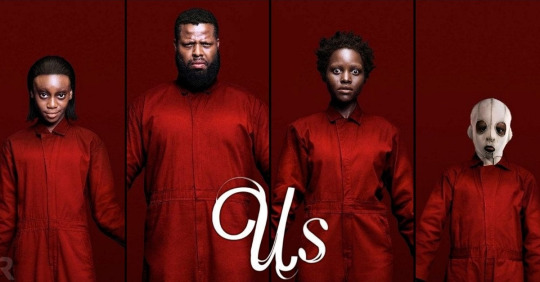
Staring the fabulous Lupita Nyong'o, the film is about a family who goes on vacation to the mothers childhood beach house. Haunted by her past, Adelaide can’t shake the feeling that something is off. She is right as a family of doppelgangers show up and chaos ensues. This film is truly creepy.
6) The Witches (2020)
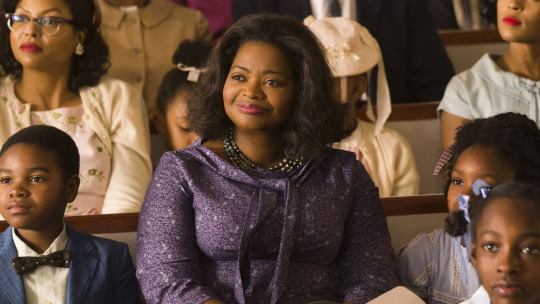
Technically not out yet at the time of this post. This is my favorite Ronald Dahl book and I loved the original movie with Angelica Hudson. The remake looks supper cute and I LOVE Octavia Spenser. The story is about a boy whose parents die, he goes on to live with his grandma, she tries her best to prepare him for the dangers of the world, and he encounters a ploy by you guest it real life witches. The witches scheme to turn every child into a mouse. It is up to Luke and his grandma to save the day!
7) The Haunted Mansion

In this silly family friendly comedy, Eddie Murphy plays a realtor who is more interested in making a sale than he is in spending time with his loved ones. While on their way to a family vacation, Murphy stops at a potential clients mansion and learns that there is a mystery afoot. Based off the beloved Disney park ride, the Haunted Mansion is full of ghosts, murder, mystery, charm, and intrigue.
8) A Vampire in Brooklyn
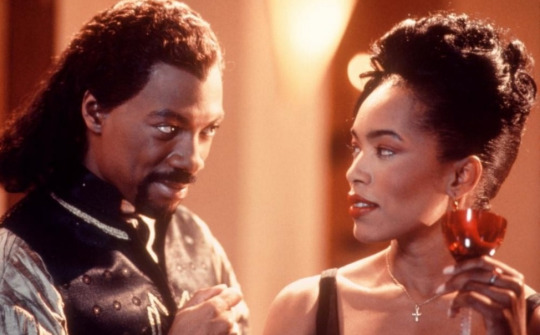
Eddie Murphy has never looked so fine! Also staring the beautiful Angela Bassett, this romantic love triangle film will be sure to thrill anyone who is a fan of gothic romance.
9) Blade
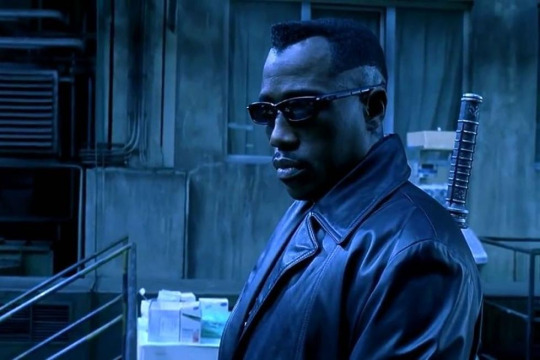
Give me more sexy vampires please! I’m not usually one for action films but this one ( based off the Marvel superhero) actually works. It’s about a half vampire who is out to avenge his dead mother by taking out other vampires and villains. The martial arts and costumes alone make this film a enjoyable watch.
10) Gothika
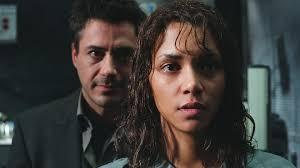
Staring Hallie Barry, this film is about a psychiatrist who has a frightening encounter on the road while driving home one night. She wakes up in the mental hospital she works at only to discover that her husband has been murdered and she is the one accused of killing him. Barry tries to maintain her sanity while proving she is innocent. But is she?
11) Night of the Living Dead (1968)
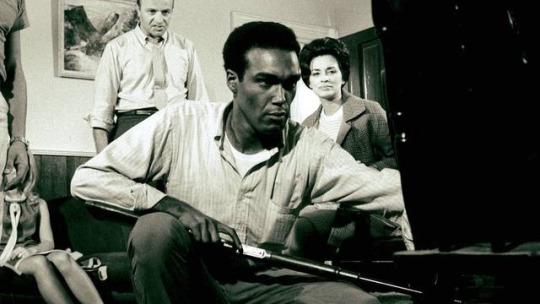
Admittedly not one of my favorite films, but I have included it because of what this film did by paving the way for Black cinema. If it were not for Romero’s decision to cast Duane Jones as Ben, a (black) man trying desperately to survive the zombie apocalypse and protect a group of (white) survivors, we might have not ended up with all these other horror films listed. This film came out during the American Civil Rights movement, at the time white people were not on board with interracial film and television. Even when Sesame Street came out in 1969, it was banned in some areas because of its interracial cast. Having a black actor as a main character during this time was unheard of.
That’s it for now! Hope this list will inspire someone to watch something else besides Beetlejuice (I love this movie but there are other movies out there) this Halloween. If anyone wants to add to this list feel free to :)
Honorable mentions (as cool as these characters are they are not the main focus of the story or they are problematic but I still wanted to give them a shout out):
Queen of the Damned: Akasha played by the late Aaliyah.
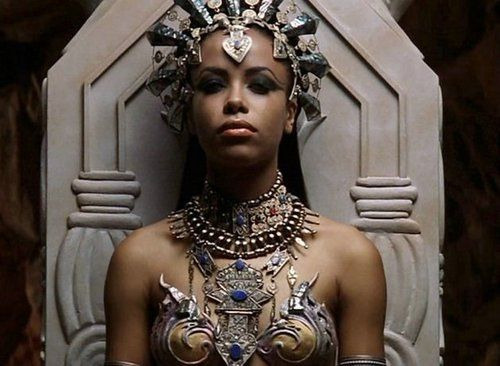
Rochelle from The Craft. Her character was well written for the first half of the film, then it all falls apart.

Laurent from Twilight. Just because I hate Twilight, that doesn’t mean that I can’t appreciate how hot Edi Gathegi is in this film.
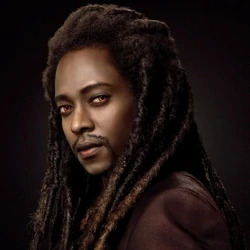
Candyman. This movie has a interesting plot, a folklorist is doing research on a urban ledges and discovers that it is real. Not bad but the problems is who the antagonist is taking his anger out on. To quote a article I once saw about the movie, “you can tell that there were no black women in the board room when this film was being pitched”.
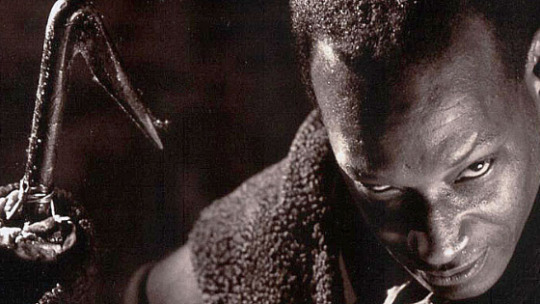
17 notes
·
View notes
Text
References in The Deadfast Club/Devil’s Night
Forgive the 1 A.M. theory brain, I have some other things to do so this was, admittedly, only breifly researched, but there are two pop culture references that stood out to me in these two episodes the most- This Mortal Coil and The Breakfast Club
Wile most of Scream's references are, obviously, to horror movies- from Tony Todd, AKA Candyman being the Hook Killer, to the discussions of "Get Out" and Jordan Peele (hilariously, this season was filmed over two years ago and Jordan Peele just announced that he's doing a Candyman movie a couple of months back), these two were very prominent but not at all horror related
This Mortal Coil is the name of the book Beth is reading, wich is prominently displayed to the camera, but the only results I found with that name are to a musical group that ran in the 80s/90s, and a dystopian YA novel, neither of wich looked like the kind of book Beth was reading, wich looked like a classic- hard leather bound with no cover art, as opposed to the YA novel that's far more modern looking
The musical group is described as having "gothic, dream pop sound", with the first and last albums they produced sounding like they could relate to Scream as a franchise- "It'll End In Tears" and "Blood" could both easily relate to the series, but aside from that and having gothic leanings, I'm not sure what this reference could provide, especially in book format
The YA novel however is far more interesting
The YA novel is all about DNA- specifically, recoding DNA, allowing people to "change their bodies in any way they want", the book's primary theme also seems to be about trust- who you can trust, you can't, and if you can even trust yourself
If Deion's brother really IS alive and the killer, this could be a great easter egg for that
My trouble believing it is that Scream has always surprised us with the killer reveals, for the killer to be the most obvious suspect who was guessed in episode two seems shoddy, but far more than that, Scream is about defying tropes and expectations, as they did in the opening scene with little!Ghostface being the first victim rather than the pretty teenager, even exiting the "kill the girl" trope by killing a child- and a boy at that- for the first victim
Maybe this really is the era of changing Scream's narrative
Kym said herself that the this was a different genre of horror than what had been established before, where "we make our own rules", "we" referring to POC- specifically black, wich is a good distinction for her to have made, actually
Wile Jordan Peele and "Get Out" were the only ones directly referenced, horror starring black charectors is SIGNIFICANTLY different than horror starring white charectors, and often defies the typical white tropes- yes, Jordan Peele is an example, but also "The Intruder", "No Good Deed", "When The Bough Breaks", among other newer ones, but even older, classic horror has this distinction, specifically, Night Of The Living Dead breaks alot of horror tropes- especially for the era- and turns what could have been a basic zombie movie into a really social-political-laden message with a truly tragic ending
It's worth noting that of "The Deadfast Club" (a reference I'm about to go into later) only Manny and Beth are white, a great and stark contrast to most of these kinds of groups in movies
This iteration of Scream could be breaking some of the rules, and though Scream is known for breaking horror movie rules in general, it could be that, as this iteration is the first not to star a white protagonist, there's an effort being made to break even MORE rules- even some of the ones Scream it's self usually held dear, and one of those could be the very format, instead of spending the entire show wondering who the killer is, we find out in episode three or four who it is and spend the rest of the series just trying to defeat him- or even resolving the loose ends of his backstory somehow
I could go on about this more but it's now 2:15 so I'd better move on
The Breakfast Club is the other major reference that doesn't fit in with the typical horror movie jargon
In fact, it's so prominent that episode one is named "The Deadfast Club", the only title I know of to make a clear movie reference, and yet it isn't to a horror movie
It isn't like that's new, all of the second season episodes were named after horror films, but that's just it- HORROR films
Scream has only ever been about analyzing and breaking down the horror genre, I don't remember ever seeing a reference quite this big to anything non-horror in Scream before
That said, I'd like to pick at the meaning for this
Firstly, Manny is right, The Breakfast Club only had five roles and five stereotypes (although six charectors, I can't see yet how Manny could fit Vernon's role)
But here comes another interesting problem- wile it's true that Manny doesn't fit any of the five stereotypes... neither does Kym
The stereotypes fit the other four seamlessly
"The Princess"- Liv, Deion himself calls her an "It girl"
"The Athlete"- Deion
"The Brain"- Amir
"The Criminal"- Beth
But that just leaves "The Basket-Case" and I don't think that can apply to Kym, unless the term is meant more affectionately in the movie (I wouldn't know, having not seen it) but I have a feeling that isn't the case, and even if it was, it still wouldn't fit, Kym is passionate sure, but I haven't seen anything that could make her suit a term like "crazy"- not to mention "basket case", only and simply "rebellious", but "criminal" certainly doesn't fit her either as, to my knowledge, she's never committed a crime
This leaves a pretty interesting opening- well, two interesting openings:
1. If Kym and Manny don't have roles to fill, will they be the two lone survivors? The writers had to put some thought into making these charectors fit to the stereotypes in order for The Deadfast Club to really work as a reference but purposely created Manny and Kym to oppose ALL of them, they could have just as easily created the two of them to simply "share" roles with the others, making Manny fit more of the "brain" role for example, but choosing not to means they want these two to stand out
And how convenient that they just so happen to be the only long-standing freinds in The Deadfast Club, the only ones not getting to know eachother for the first time
Ofcourse by the same factor this could mean they'll be the only two to die but that would suck on alot of levels
2. Far more importantly though, not only did the writers specifically care to create two charectors that didn't fit any roles... they also chose to have one role that didn't fit any of the charectors, unless you double up and label Beth as "the basket case" too, wich I don't personally buy- why would they bother doing that? Why not make a charector just for that role? Or atleast make it alluded to that Beth was both- then there's one role that doesn't have anyone in it
That's awfully strange, that's not just one, but two flaws for The Deadfast Club as a theme
Beth even tries labeling them all herself but when she gets to Kym, who she was obviously going to label "The Basket Case", Kym stops her, both refusing that label and refusing to be labeled at all- very significant
Heading back to our previous point on different types of horror, Beth herself claims that most of the group being black is an "instant kill", and wile LGBTQ+ people are scarce in horror, they're usually just as quickly murdered, the "Burry Your Gays" trope certainly didn't emerge from sitcoms after all
If Kym and Manny are the only survivors, that would be breaking a handfull of "horror rules" right there, and bring us full circle to Kym saying that "we make up our own rules"- plus, Deion is being given to us as the hero, and Liv was, as Beth said, "final girl material", we expect both of them to make it out alive because horror as a genre dictates that we should, but what if episode five gets here and it's Kym who becomes the hero?
I went off topic there but there's something more important about there not being a "basket case" role in the Deadfast Club, namely: What if there IS one and we don't know it yet? Namely, the killer?
There are two options with that:
1. The killer is an outsider who becomes involved with the Deadfast Club in some way down the line, sort of like how Shane was- who I was going to nominate for this before he was killed off- or is perhaps already connected to them (like Deion's brother) or...
2. The reason we don't have a clear basket case is because one of the Deadfast Club is the killer
In this case, it could be anyone
As Manny and Kym don't have labels, it could be one of them (thus filling the roles and leaving wichever one ISN'T the killer to be the Final Girl) or it could be one of the other four doubling up on labels like I suggested earlier on
If this is the case, my money is on Liv- as The Princess, she would be the least likely to be suspected, it would be a unique twist, and no one in the group would think to suspect her (except maybe Beth but she'll probably be killed right after coming to this conclusion)
Regardless of who it is, they'll have to do a new list in the last episode referencing the dead members, and the new discovery of their basket-case....
Believe me, I want to go into this SO much more, but it's 3 AM now and I still have other things to do, trust me though, tommorrow brings more Scream, and with luck, more theories as well!
6 notes
·
View notes
Note
Gimme your thoughts about Us, I’m still dumb af - You know who it be
I’m putting off an essay to write this but let’s ROCK and ROLL, BABY!
So, spoilers below the cut, just as a warning for anyone who still wants to see Us (2019), dir. Jordan Peele. If you’re unable to see the movie for whatever reason, you can feel free to read this and garner some ideas from it, but I still suggest seeing the film, in the end. A lot of this won’t make sense unless you’ve seen Us!
I normally don’t go out for too much horror, but I do think the Jordan Peele movies are legitimately great works of art, and very culturally relevant, so if you want to be supportive of black artists, black art, and the vocalization of the black experience, I highly suggest going to see these movies or watching them at home.
They’re not actually overly violent or exploitative, and understanding that the violence in the films is meant to be metaphorical for the systemic violence perpetrated against oppressed groups helps to contextualize the stuff you do end up seeing. So, without further ado, let’s get into some Thoughts about some Cinema.
So, first of all, I have to say that I haven’t stopped thinking about this movie since I saw it at, like, 5:30 pm on Sunday. It’s been on my mind non-stop, and I’ve been fixated on the soundtrack, particularly “Anthem” and “Pas de Deux”, along with the “Tethered Remix” of “I Got Five On It”. I love the intentionally jarring combination of sounds, and how “Anthem” is directly reflective of the idea of the “U.S. Anthem”. “Us Anthem”.
Jordan himself has been very open about the fact that the title Us is meant to also represent “U.S.”, and when Red is asked “what she is” and she rasps out “We’re Americans” it just... stuck with me.
The nonsense-singing of “Anthem”, too, fixates me, since the scorer for the film has talked about how it’s the “voices of the Tethered”, and how they’re “angry” and “ready to get free”. We know that the Tethered cannot speak, which is a major and interesting facet of their life, to me, since they’re never given “a voice” beyond this kind of animal screaming and groaning.
It’s what makes a lot of viewers see them as “sub-human”, but always gets to my heart and makes me think about the fact that they are so very keenly human. It makes me think about the repression of “lesser” languages, native languages, “non-verbal” languages. The Tethered DO have a means of communication-- clicks and rasps, cries and screams-- which definitely do pull at the human fear of “unnatural” noises, but also remind me of native languages that utilize clicks or throat sounds often not found in English.
The Tethered are deeply, intimately human. While it is mentioned by Red that two bodies cannot share the one soul, that doesn’t mean to me that the other is soulless. I really don’t think that about the Tethered. I think that they are their own people, and that their rising proves that. They’re not hollow machines that just mimic their “original” on the surface, but are just people with their own souls, people who have been wrongly oppressed and mistreated.
Us is openly a discussion about the way we, as people and as Americans, treat “others”. Whether that means the racial other, the cultural other, the class other, the gendered other, or anything other system we try to dichotomize, binarize, or diametrically oppose to something else, it’s very definitely about the ways we abuse and mistreat people in order to systemically oppress them and gain from that.
Adelaide represents this interesting kind of class-traitor, in a way, because she rises “above the others”, both literally and figuratively, and instead of making an effort to free those around her, she just rises to the top and forgets where she came from. Whether that’s about assimilating into white culture and “rejecting” the culture one came from (joining in the oppression of your own people by claiming to ‘not be one of those kinds’) or about rising to a wealthy position and oppressing the poor, forgetting what it was like to be poor one’s self, or about any number of other things, that’s up for interpretation. But the issue is still there.
Jordan intentionally left the specific meaning of the film open so that every viewer would be forced to engage with it personally. Who do you, personally, help to betray? Who do you, personally, help to oppress? Whose suffering do you, personally, benefit from? You’re forced to grapple with that, and forced to acknowledge the reality that every single one of us is part of the issue. You only climb higher by putting someone below you, and this movie forces you to recognize that.
I’ve heard people complaining that Us isn’t as good as Get Out specifically because it’s more open-ended, but I think that’s what makes both films fantastic and beautiful. Get Out brazenly exposes the direct experience of everyday black horror, and is completely open about it. It’s a one-to-one analogy. But Us is for everyone, making you wrestle with yourself. You are your own Tethered. You are the good and the bad of yourself. And neither one is fully good and neither one is fully bad. Get Out was a master-class in analogy, but Us is more of a metaphor; it doesn’t need to have everything laid out. Its horror and its beauty lay inside of its intentional cloudiness.
I’m really obsessed with the rabbit imagery, too. I love bunnies, and seeing them become symbolic of this horror really was an interesting take. Jordan himself has expressed being uncomfortable with and scared of rabbits, specifically because he can see that they’re “soulless” inside; he says that if you took the brain of a rabbit and put it in a person, you’d get Michael Myers. Totally void, just ready to hurt. And I think that’s an interesting take on them. He also points out that the image of rabbit ears, the shape of their head, mirrors the shape of the scissors that the Tethereds use.
I also love the way that rabbits are largely docile little creatures, but can bite pretty hard if provoked, and I feel that’s a good way to look at the Tethered. I don’t see them as inherently evil or violent, just pushed beyond their own limitations. They did what we all did as Americans: they led a violent uprising against their oppressors, then ‘peacefully’ took their place, all the way across America. They are us, for better, for worse.
The choice to use the 80′s references really often also caught my attention; Jordan talks about how the 80′s nostalgia is this double-edged sword, since everyone is longing to go back, but not realizing the costs and weights of that, the evil lurking under the placidity and “wholesome American image” that the 80′s sought to project.
The all-American, apple pie, small-town fun and games of the 80′s also came with the Reagan administration, the AIDs crisis, the war on drugs, a massive rift between the rich and the poor (with a steadily more wealthy middle class expanding from just middle class into rich, upper middle class individuals and extremely poor lower middle class), and “sublimated racism”. We pretended, as a nation, that we were now post-racial, but that was such, such, such a huge lie.
So setting the memory scenes in the 80′s, using 80′s film references, 80′s imagery, 80′s sound-a-likes, the Michael Jackson stuff: it all points to the duality of what we love, what we are nostalgic for. Michael was a hero of the 80′s, but now...
Speaking of Michael Jackson, notice carefully the costuming of the Tethereds. Red jumpsuit, single glove, ‘the monster is not what it seems’, the “Thriller” t-shirt... why, Jordan, one might think that you made the Tethereds look like Michael in “Thriller”!
Which he obviously did, guh-doy.
I mean, the glove/sharp symbol also is an homage to good ol’ shithead Freddy Krueger, too, but it’s definitely a potent nod to Michael Jackson. We know that Adelaide (now Red) had seen the “Thriller” video as a child, and that she wanted the shirt with him on it, so the image of the Tethered is this combination between the Hands Across America symbols and the Michael Jackson look in “Thriller”. Adelaide (now Red) never forgot.
Also, god, Hands Across America? Talk about 80′s false optimism! It’s incredible how potent that image is for the issue being discussed. For those of you who don’t know, Hands Across America was an initiative in the 80′s to help end hunger and homelessness in America. The idea was that every person in America would join hands and form a line “from sea to shining sea” across the entire lower 48 continental states, and for each person in line, $10 dollars would be donated to the cause.
The event, of course, failed in many ways. First, there’s no POSSIBLE way for people to join hands across the whole continent; the terrain of the US makes it entirely impossible. Plus, the time necessary to conduct that would be incredibly exhausting for people standing in line! But what’s worse? The project did successfully raise ~$34 million, but nearly $20 million of that disappeared into “event costs”: paying the celebrities that endorsed it, paying the event organizers, et cetera. Only around $15 millions made it to the homeless and hungry. While $15 mil. is no small number, that’s.... less than half of what was raised. So where did all that go? Into the pockets of the already rich. It’s such powerful symbolism, especially within the context of the film.
Oh, also, while still on the 80′s talk, the opening shot of the film features a VHS copy of the movie C.H.U.D., a movie about “sub-human underground sewer dwellers” who rose up to eat the surface humans. These “CHUDs” were one-to-one analogies for the homeless and impoverished.
I cannot get over how strong the storytelling is in Us, I just can’t. I’m obsessed with it. I cannot help but wanna talk about it all the time! It’s so GOOD and I’m so FRUSTRATED that I’m gonna cut myself off here to stop from ranting about every teeny tiny thing and every big major thing because no one will know what I’m on about, but, seriously, do yourselves a favor and go see Us.
This movie will make you have to sit down and think about whose suffering you’ve benefited from, and what you need to do within yourself to change this.
Also, before I go, I just gotta say I love, love, love the decision Jordan made about having the 1980s version of the hall of mirrors be “Native American” themed, only to have that “politically corrected” in the 2010s to be “Merlin’s Hall Of Mirrors”, which is just a facade thrown up over a still-racist, exactly the same hall of mirrors. The problem lurks within, never gone, just covered.
Also, that ties to the Kubrick connection (The Shining is a major inspiration for Jordan) and the genocide connection, so, uh, it’s deep out here, lads.
Anyway, I have opinions about movies.
#also lupita deserves an oscar for this role no joke#her 'red' voice? ogh my god... oh my god#HER M II I I I I N D !!!!#messages#long post#us spoilers#Anonymous
8 notes
·
View notes
Text
Top 10 Best Films of 2017 - End of Year List
I did a mid-year ‘best of’ list, so it was only fitting that I returned to the format at the end of the year to run down my top 10 favourite films of the year. Only three films from my mid-year list remain here, which is a testament to what an incredible year it has been for film. As far as I’m concerned, 2017 has been a real banner year for cinema and it has seen the release of several all-time greats that I look forward to enjoying for many years to come.
Since I’m based in the UK there will be several notable omissions here (I still eagerly await films like Phantom Thread, I, Tonya and The Post), purely by dint of the fact that they have yet to be released in this country. Do look out for them in my forthcoming most-anticipated of 2018 list!
Honourable mentions: Custody, Brimstone, The Disaster Artist, Professor Marston & the Wonder Women, Call Me By Your Name
1. Star Wars: The Last Jedi, dir. Rian Johnson

While the placement of this film on my list may be resoundingly predictable (check out the total lack of bias signalled by my username!), the thrilling thing is that the film itself is anything but. The Last Jedi shatters the Star Wars mould to entertain new forms of storytelling and question long-held assumptions. It’s a shockingly meta story in how it questions the conventions of Star Wars - particularly those concerning lineage and its implications - but it is never meta in an ironic sense. There are no wink, wink moments, and while the past is investigated and questioned it is never mocked. Instead of descending into irreverence, The Last Jedi is meta in a way that feels absolutely necessary and justified if Star Wars is to remain fresh and vital as it moves forward. Bloodline and history do not have to dictate destiny in this new version of Star Wars - the heroes are those who understand this, and the villains are the ones who fail to grasp the same lesson. It’s a beautiful and intellectually rigorous movie, and I’m thrilled by how it elevates and re-contextualises the stories that came before it while pushing the characters and their relationships forward. I have no idea of where Episode IX will take this story, and that is incredibly exciting to me. Bring it on.
2. Blade Runner 2049, dir. Denis Villeneuve

There are a million and one reasons why this movie shouldn’t have worked, but Villeneueve proved his genius by making a sublime sci-fi picture that actually surpasses its predecessor. I have always admired the original Blade Runner more than I’ve enjoyed it, and that’s because I have always found it emotionally distant. Deckard struck me as a mumbling arse and his romance with Rachael always felt obligatory, not organic. The genius of Blade Runner 2049 lies in how it made me care - it made me care about the love between Deckard and Rachael (which was something of a miracle in itself), and it made me care about the love between K and his holographic girlfriend Joi. With these emotional hooks in place, everything worked as a thrilling symphony. The cinematography is easily the best of any film in 2017 (sorry, Dunkirk - I still love you) and this film has an astonishing number of scenes that still linger in my mind after many months - the very modern threesome, the shootout in the gaudy pleasure palace, the fight in the rain, the father seeing his child for the first time. It’s a breathtaking film and I couldn’t be more excited to see what Villeneuve does next.
3. Dunkirk, dir. Christopher Nolan

Dunkirk is such a striking and effective piece of cinema that it actually made me overcome my innate bias against war movies (I blame too many tedious Sunday afternoons wasted on mandatory viewings of The Great Escape at my grandparents’ house). With Dunkirk, Nolan has probably made his most accomplished and sophisticated movie - it starts off unbearably tense and doesn’t release its grip on your pulse until the final scene, when its hero finally drops off to the blessed peace of sleep. Nolan employs a tricksy converging structure with multiple plot strands to ramp up the tension and provide different perspectives on the evacuation, masterfully playing them off each other to assemble the big picture. While criticised by some for its apparent lack of character, I can’t really agree with that assessment - Dunkirk is probably the most powerfully humanistic war film I’ve ever seen, and by stripping its characters down to their rawest selves it reveals some uncomfortable yet powerful truths about all of us. The characters are somewhat distant from us - we never hear them pine for lovers or miss their mothers - but the removal of these storytelling shorthands leaves us with soldiers who behave exactly as you would expect frightened, stranded children to. And there’s something terrifyingly poignant about that.
4. mother!, dir. Darren Aronofsky
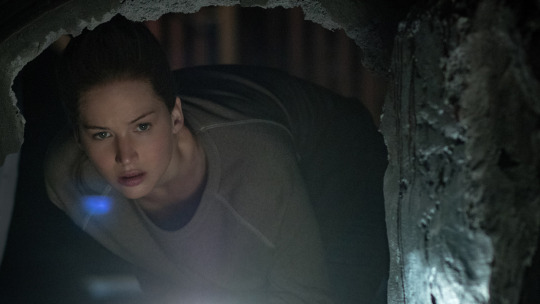
mother! is the work of a madman with no fucks to give, and it is what I choose to refer to as ‘peak Aronofsky’. He made what is clearly an allegory, and while he had his own intentions with said allegory (which he has been very loud about declaring) the film is so cleverly constructed that it can simultaneously be about the entire history of the world and the plight of the tortured artist’s muse - either reading is perfectly correct and supported by the text. mother! is a piece of art that has provoked a lively and frequently heated debate, and while it needs to be read as an allegory to make any kind of sense as a narrative I also don’t want to undersell this movie as an emotional experience. If you go into mother! willing to be challenged and content to be swept up in a bold artistic vision, it has the potential to be a really absorbing and engrossing film - it is anchored by Jennifer Lawrence’s remarkably brave and unrestrained performance. She is not playing a grounded character, but her performance is palpably real and frequently painful to witness - she portrays the whole spectrum of emotions, from mild bemusement to shrieking horror, and the whole film soars on the strength of her efforts. This is a uniquely strength and esoteric film, and I am incredibly happy that it exists.
5. Get Out, dir. Jordan Peele

This film really knocked me for six, to such an extent that I simply had to see it twice in the cinema. It got even better upon a re-watch, when I was able to watch it with full knowledge of the characters’ underlying motives and the things to come. It’s a terrifying concept (the racism of an all-white suburb is taken to a horrifying extreme) executed with incredible panache, and you feel every emotion that Chris goes through thanks to Daniel Kaluuya’s excellent performance. Get Out also represents one of the most brilliantly communal experiences I’ve ever had at the cinema - I won’t spoil it, but let’s just say that the audience erupted into spontaneous applause at a key moment in the climax. Simply fantastic.
6. The Handmaiden, dir. Park Chan-wook
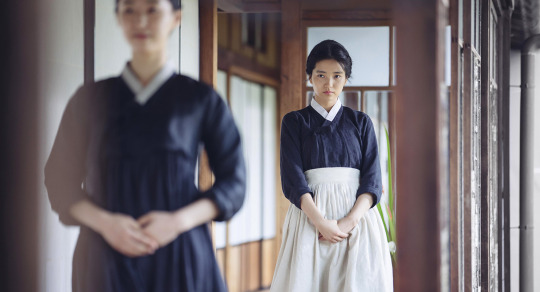
This film is exquisite - it’s first and foremost a beautiful boundary-smashing love story, and an absolutely marvellous tale of female defiance. It transplants Sarah Waters’ novel Fingersmith to 1930s Korea, and the story is effortlessly adapted to become intrinsically interwoven with its new setting. Sookee is a talented pickpocket plucked from a thieves den and sent as a handmaiden to trick a rich heiress into falling for a conman. To say any more would spoil the twists, but this film is just a masterwork of suspense, keeping you guessing throughout a series of interlocking pieces that take their time to reveal their secrets. I’ve seen the theatrical cut and the extended version, and they’re both great - you’re in for a treat with either.
7. The Florida Project, dir. Sean Baker

This is one of the best screen depictions of childhood I’ve ever seen. Our hero here is Moonee, a smart-tongued and cheeky six-year-old. Moonee lives in a motel room with her abrasive but loving mother, but since she’s a child she doesn’t mope or lament her poverty - she takes her surroundings for granted and makes the tacky shops and hotels that form her world her very own theme park. The Florida Project is firmly committed to adopting a child’s eye perspective, and while it can feel a bit meandering to begin with it gradually accumulates pace and purpose, building to an utterly heartbreaking and unforgettable climax. The performances here are extraordinary, and Brooklynn Prince is so palpably real as Moonee that she’ll own your heart by the end of the movie (having squeezed it to bursting point on several occasions).
8. The Shape of Water, dir. Guillermo del Toro
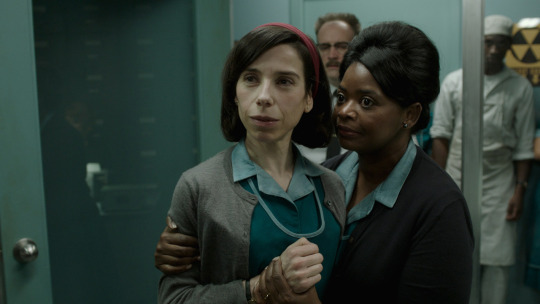
I’ve long been a huge del Toro cheerleader, and this movie is perhaps best described as ‘peak del Toro’ - it has the mannered, detail-oriented set design, the charming quirkiness, the subverted horror, and the woozily strange romance that he has employed again and again in his films. This story, however, is unusual for del Toro in that it is ultimately optimistic and hopeful - it’s the daddy of all supernatural romances in that it is a full-blown love story between a mute human woman and a fishman, and it is characterised by total commitment and self-belief. Think Creature from the Black Lagoon done with the creature as the romantic hero. The Shape of Water has a certain playfulness that means it never feels ponderous or silly, but it affords its characters real respect and dignity and makes you care for them deeply. This movie makes me excited to see where genre filmmaking can go next (hint: I hope it only gets weirder).
9. Thelma, dir. Joachim Trier

Who knew something like this could come out of Norway? This was probably my biggest pleasant surprise of 2017 in terms of film - I went in with no expectations at all, and came out wowed. This is an intensely strange and effective supernatural horror that follows a girl with strange repressed powers that manifest whenever she experiences desire. It could be a hackneyed or exploitative premise in the hands of a lesser filmmaker, but Trier shows a deft hand and a remarkable talent for building tension and creating a sense of heightened reality. There is one scene set to ‘Mountaineers’ by Susanne Sundfor that is one of the most transporting experiences I have ever had in the cinema - the combination of the ethereal music and the mounting suspense makes for real film magic. This was a great reminder of how important it is to take chances and try out films outside your comfort zone.
10. Jackie, dir. Pablo Larrain

This is a film that soars on the strength of Natalie Portman’s incredible performance, which is complemented by Mica Levi’s haunting score. Portman’s performance is painfully vivid, with her agony and wretchedness coming through so intensely that it’s often uncomfortable to watch. Jackie is probably the best portrait of grief I’ve ever seen, and it sucks you into a famous historic event by providing an incredibly intimate perspective on it. This is great cinema, but be prepared for suffering.
#best of the year#film#cinema#the last jedi#blade runner 2049#dunkirk#mother!#get out#the handmaiden#the florida project#the shape of water#thelma#jackie
207 notes
·
View notes
Text
Smokey brand Movie Reviews: Hands Across America
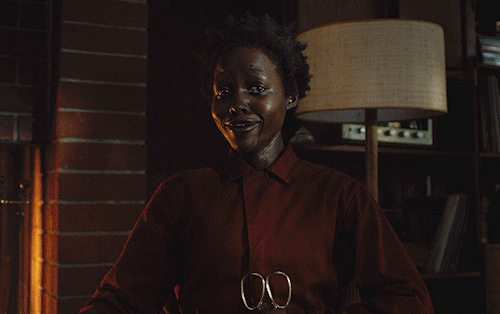
So i saw Us. It was a experience, for sure. The hype for this thing was ridiculous. Ever since that sneak trailer drop, i have been kind of looking forward to his one. I didn’t see Get Out in theaters because the premise made me angry. I didn’t want to make that same mistake with Us. The second those tickets went up, i got them. I aw it yesterday after work. Then again this morning. It took me two showings to adequately address this flick.
The Best
Lupita Nyong’o. Holy sh*t. Like, i know ma is excellent at her craft. She rarely disappoints. Even in Black Panther where she didn’t get much to do, she owned that role. But here? Man this is HER movie. Her dual roles as Adelaide and Red were executed perfectly. This was an actual, legitimate, inspired, performance and is well worth the price of admission, alone.
Jordan Peele does it again. He is fast becoming one of the best to do it and it’s kind of inspiring. I enjoy how he tells stories centered around people who look like me, that aren’t f*cking Medea flicks or another version of Juice. We aren’t hustlers, gangsters, or slaves in his films. His characters have depth and his vision is profound. With two home runs on the books, i look forward to his third attempt.
This is the second review where i have to praise the sound design. Holy sh*t, this stuff makes the movie! The little creaks and pops you hear, just off screen. The way the Tethered grunt and his.The way certain, familiar songs, are used to juxtapose cruel, aggressive violence... It’s all goddamn outstanding. Seriously, the Five on It remix is f*cking sinister and i love it!
The Better
Winston Duke was awesome as always. I love seeing my people get he opportunity to shine. His M’Baku was a standout in Black Panther and he shows up in Us just as prominently. I was a little surprised to find out his role wasn't as beefy as i thought,but it was pleasant. I imagine the screen time went to Lupita and, i can’t stress this enough, she blew it out of the water.
Their two kids were amazing as well. Shahadi Wright and Evan Alex give legit performances as child actors. Usually kids don’t do too well in film. There are exceptions, Dakota Fanning immediately comes to mind, but these two kids did a pretty legit job, especially alongside of a powerhouse like Lupita. Evan Alex, specifically, was excellent. He was a standout in a film full of standout performances.
This movie is gorgeous, man. It’s legit work of art. Each frame, every pan, all of them; goddamn beautiful!
The Good
There’s a great deal of levity in this thing. There are legit horrors happening to this family and cat are cracking dad jokes. it’s f*cking ridiculous. It didn’t bother me in the first screening but the second? It’s incredibly prominent. It doesn’t detract, per say, i was just really, really, aware.
Elizabeth Moss and, surprisingly, Tim Heidecker, were pretty legit! I did not expect these cats to be as endearing as they are. The thing is, though, why were they even in here? Absolutely unnecessary. I imagine Peele needed to raise the body count or something? I dunno, man.
The overall story is very interesting. It’s inspired by an old Twilight Zone episode and that’s exactly what it feels like. This is a big budget, TV movie, that has no right to be as good as it is. Everything about this flick is kind of contradictory that way. The focus is on this family but the overall feel, the actual scope of this flick, is mad broad. The ambition is there but i think it needed to be tightened up a bit. You can tell Peele had a lot more t o say but ended up just kind of giving us the cliff notes.
You kind of need to suspend your disbelief a little more than you did in Get Out. The logistics of how certain events occur in this film are... profound. I don’t understand the whole mirror aspect too much because it kind of does it’s own thing. Like, there are times when the world’s rules don’t abide by themselves? That can frustrating but probably not on the first viewing. This didn’t really bother me until the second.
If you’re paying attention, the twist is kind of telegraphed. The first time i saw it, i kind of figured it would go that way the second Adelaide saw Red the first time. The second time i saw it, it put a completely different spin on that movie. It made it even more f*cked up when you realize certain things and reactions are occurring because of certain events.
There’s a revelation toward the end that kind of deflates but Lupita caries the exposition. While i was disappointed there was an actual explanation, a very pedestrian one in that regard, i was still kind of riveted by the delivery.
The Verdict
Us is... interesting. It's a great film, don't get me wrong, but it feels off. I'm not entirely sure how to feel about it. I think I enjoyed it. I was entertained. But I don't know that it's lived up to the hype? Like, it didn't scare or disturb me. I didn’t feel like it’s a masterpiece of horror, as literally everyone wants it to be. With Get Out, i understood why that was good. I knew why that was scary. I felt that sh*t because, for black people, that sh*t is very real. It’s our reality. Us isn’t that heady. It’s what i think, Peele thinks, people want to see out of horror. Coming off the genius that was Get Out, this feels pitch. It wasn't even creepy. To me. Everyone else was losing their sh*t left and right but I was more watching Lupita's dual performances. Ma was brilliant. Her Adelaide/Red is more than enough to recommend this flick and i do recommend this flick. Just, tempered your expectations. It’s amazing, true, but i don’t think it’s as good as people want it to be. I think if this wasn’t a Jordan Peele movie, cats would have a different opinion.
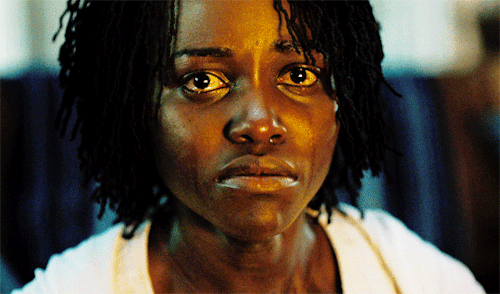
0 notes
Text
Smokey brand Movie Reviews: Hands Across America
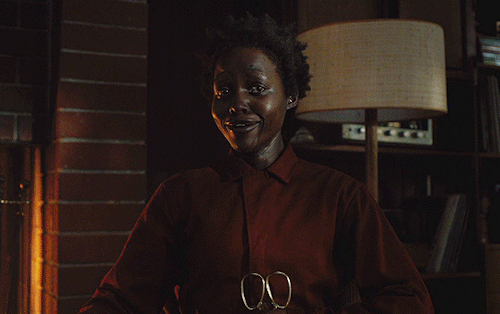
So i saw Us. It was a experience, for sure. The hype for this thing was ridiculous. Ever since that sneak trailer drop, i have been kind of looking forward to his one. I didn’t see Get Out in theaters because the premise made me angry. I didn’t want to make that same mistake with Us. The second those tickets went up, i got them. I aw it yesterday after work. Then again this morning. It took me two showings to adequately address this flick.
The Best
Lupita Nyong’o. Holy sh*t. Like, i know ma is excellent at her craft. She rarely disappoints. Even in Black Panther where she didn’t get much to do, she owned that role. But here? Man this is HER movie. Her dual roles as Adelaide and Red were executed perfectly. This was an actual, legitimate, inspired, performance and is well worth the price of admission, alone.
Jordan Peele does it again. He is fast becoming one of the best to do it and it’s kind of inspiring. I enjoy how he tells stories centered around people who look like me, that aren’t f*cking Medea flicks or another version of Juice. We aren’t hustlers, gangsters, or slaves in his films. His characters have depth and his vision is profound. With two home runs on the books, i look forward to his third attempt.
This is the second review where i have to praise the sound design. Holy sh*t, this stuff makes the movie! The little creaks and pops you hear, just off screen. The way the Tethered grunt and his.The way certain, familiar songs, are used to juxtapose cruel, aggressive violence... It’s all goddamn outstanding. Seriously, the Five on It remix is f*cking sinister and i love it!
The Better
Winston Duke was awesome as always. I love seeing my people get he opportunity to shine. His M’Baku was a standout in Black Panther and he shows up in Us just as prominently. I was a little surprised to find out his role wasn't as beefy as i thought,but it was pleasant. I imagine the screen time went to Lupita and, i can’t stress this enough, she blew it out of the water.
Their two kids were amazing as well. Shahadi Wright and Evan Alex give legit performances as child actors. Usually kids don’t do too well in film. There are exceptions, Dakota Fanning immediately comes to mind, but these two kids did a pretty legit job, especially alongside of a powerhouse like Lupita. Evan Alex, specifically, was excellent. He was a standout in a film full of standout performances.
This movie is gorgeous, man. It’s legit work of art. Each frame, every pan, all of them; goddamn beautiful!
The Good
There’s a great deal of levity in this thing. There are legit horrors happening to this family and cat are cracking dad jokes. it’s f*cking ridiculous. It didn’t bother me in the first screening but the second? It’s incredibly prominent. It doesn’t detract, per say, i was just really, really, aware.
Elizabeth Moss and, surprisingly, Tim Heidecker, were pretty legit! I did not expect these cats to be as endearing as they are. The thing is, though, why were they even in here? Absolutely unnecessary. I imagine Peele needed to raise the body count or something? I dunno, man.
The overall story is very interesting. It’s inspired by an old Twilight Zone episode and that’s exactly what it feels like. This is a big budget, TV movie, that has no right to be as good as it is. Everything about this flick is kind of contradictory that way. The focus is on this family but the overall feel, the actual scope of this flick, is mad broad. The ambition is there but i think it needed to be tightened up a bit. You can tell Peele had a lot more t o say but ended up just kind of giving us the cliff notes.
You kind of need to suspend your disbelief a little more than you did in Get Out. The logistics of how certain events occur in this film are... profound. I don’t understand the whole mirror aspect too much because it kind of does it’s own thing. Like, there are times when the world’s rules don’t abide by themselves? That can frustrating but probably not on the first viewing. This didn’t really bother me until the second.
If you’re paying attention, the twist is kind of telegraphed. The first time i saw it, i kind of figured it would go that way the second Adelaide saw Red the first time. The second time i saw it, it put a completely different spin on that movie. It made it even more f*cked up when you realize certain things and reactions are occurring because of certain events.
There’s a revelation toward the end that kind of deflates but Lupita caries the exposition. While i was disappointed there was an actual explanation, a very pedestrian one in that regard, i was still kind of riveted by the delivery.
The Verdict
Us is... interesting. It's a great film, don't get me wrong, but it feels off. I'm not entirely sure how to feel about it. I think I enjoyed it. I was entertained. But I don't know that it's lived up to the hype? Like, it didn't scare or disturb me. I didn’t feel like it’s a masterpiece of horror, as literally everyone wants it to be. With Get Out, i understood why that was good. I knew why that was scary. I felt that sh*t because, for black people, that sh*t is very real. It’s our reality. Us isn’t that heady. It’s what i think, Peele thinks, people want to see out of horror. Coming off the genius that was Get Out, this feels pitch. It wasn't even creepy. To me. Everyone else was losing their sh*t left and right but I was more watching Lupita's dual performances. Ma was brilliant. Her Adelaide/Red is more than enough to recommend this flick and i do recommend this flick. Just, tempered your expectations. It’s amazing, true, but i don’t think it’s as good as people want it to be. I think if this wasn’t a Jordan Peele movie, cats would have a different opinion.
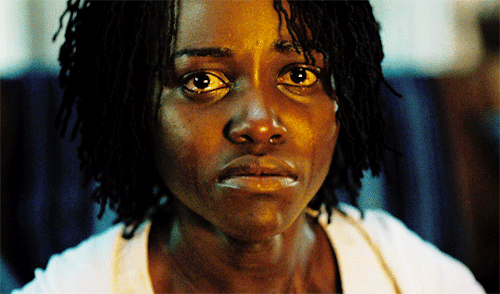
0 notes
Link
October 11, 2019 at 07:00AM
Warning: This story contains mild spoilers for Parasite.
When the director Bong Joon-Ho was a college student in Seoul, he landed a job tutoring the child of a wealthy family. He only lasted two months: “I never really helped the kid study—I was more interested in having fun with him,” he recalls with a laugh. “They fired me right away when they wanted to.”
This unceremonious dismissal is nothing compared to the bloody turn that ignites Parasite, Bong’s latest film, which arrives in theaters on Friday. The movie centers on a down-and-out family that lives in a dingy, underground apartment, frequented by stink bugs and a drunkard prone to public urination. When the son is hired by an affluent family as a tutor, he orchestrates a series of lies to secure various jobs for his parents and sister across their spacious house. As the two families grow closer together, they realize how much money dictates every aspect of life, from attitude to accent to smell—and disaster ensues.
Parasite won the top prize at Cannes, has a 100% Fresh rating on Rotten Tomatoes and will approach awards season with considerable momentum. “Bong sails beyond good enough, devising a twist upon a twist and connecting one scene to the next with ingenious precision,” Stephanie Zacharek wrote in her TIME review. “It’s impossible to figure out where Parasite is headed.”
The film is not Bong’s first story of class warfare. Snowpiercer (2013) portrays an uprising among humanity’s last survivors on a speeding train. “The original graphic novel [Le Transperceneige, which Snowpiercer was adapted from] was published in the ’80s, and now we have Parasite in 2019,” Bong said through a translator, while on a publicity tour for the movie in New York. “I think it’s meaningful that even after three or four decades, and probably over the next century to come, we’re still talking about this era of capitalism.”
While the fundamental conflict of Parasite is transmutable—Bong called it a “universal story about rich and poor”—the film is also gaspingly specific to present-day South Korea and its hardships. The specter of nuclear war from North Korea—which motivated families with means to build underground bunkers—looms large, as does flooding, which caused catastrophic damage to the country in 2011 and 2014. Bong even alludes to the economic collapse of Taiwanese cupcake shops, which many Koreans invested in heavily before they went out of business. “A lot of people filed for bankruptcy: it was a kind of trauma to Korean society,” he says.
Bong also drew inspiration from his personal history. He grew up in a different traumatic era of the country, when Seoul was under the command of a military dictatorship and tear gas wafted through the streets. When he stepped into his aforementioned tutee’s house during college, he was taken aback by one particular symbol of excess: “I remember just being so shocked to see a private sauna in a home,” Bong says. The wealthy family of Parasite, likewise, owns a sauna in its labyrinthine mansion.
Bong, too, could surely afford a sauna by now. He’s become one of the most successful directors in Korean history, with films like Memories Of Murder and The Host, and he successfully crossed over to the United States and other international markets with Snowpiercer and Okja. The transition from rich to poor is a major theme in Parasite, with one character comparing money to an iron: “It smooths out all the wrinkles.”
But Bong still feels a kinship with the ethos of the working class. “Regardless of the success or the awards, my life has been pretty much the same the past 20 years,” he says. “I think of ideas, I have a hard time writing the script, I storyboard, I shoot, I go into post.”
“Making films is a difficult job, but I just do it because I’ve never tried anything else and it’s too late to change my job,” he says with a small smile. “So I don’t really have any opportunities to consider my success or the weight of the iron. I just feel like I’m a factory that’s constantly moving on and on.”
While Bong has made a specialty of creating films about wealth disparity, he’s far from the only director to explore the subject in recent years. Hirokazu Kore-eda’s Shoplifters, Lee Chang-dong’s Burning and Jordan Peele’s Us have all recently explored poverty under capitalism in similar ways. Most notably, Us shares a startling number of commonalities with Parasite: they each focus on the clash between two mirrored families of four, one privileged and one oppressed; they sow a contrast between large, airy houses and seedy underground spaces; and are informed by house invasion tropes and horror genre frameworks.
Bong finished Parasite in March, the same month that Us was released, so he never had a chance to be influenced by the film. But he was taken aback when he saw its trailer, because it featured the familiar image of decalcomania, a technique in which an image is created on paper and then folded over to form a doubled, symmetrical work of art. “I remember being very surprised because that was actually the working title of Parasite, around three or four years ago,” he said. (He says that decalcomania is extremely common in art classes in Korea; perhaps not coincidentally, two major K-pop artists—BTS’ Jungkook and Mamamoo—also have songs with the same title.)
While Parasite and Us share many eerie similarities, Bong is unperturbed. “It’s not as if these contemporary directors and I intentionally formed an alliance—it just happened naturally,” he says. “I think that’s great: I wouldn’t call it solidarity, but it shows we all sympathize with the current climate.”
Parasite and Us also both erupt into harrowing violence, something that is far from new for Bong. Bloodshed has played a central role in many of his films, including The Host and Memories of Murder. (On an unrelated note, the serial killer that the latter film was based on confessed to his crimes earlier this month after three decades. “It’s bringing back a lot of memories and some of the struggles I had back then,” he says of the news.) Violence in film has been the subject of a heated dialogue over the past month thanks to Todd Phillip’s Joker, in which the disaffected lead character embarks on a series of murderous sprees. Many have condemned the film based on the concern that it portrays violence in a glorified light and could lead to copycat crimes.
But Bong feels that, for the most part, these criticisms are unfounded. “I don’t really think that films lead to violence in the real world—I think it’s the other way around,” he says. “Films, novels and all creative works, they always reflect the violence that exists in the world, but a beat late. If we are concerned and anxious that the violence depicted onscreen will influence our real world, I think it means that our current reality is that capricious and dangerous.”
Systematic oppression, compassionless communities, global warming, serial killers: Bong’s movies are driven by unrelentingly dark and fatalistic themes borne out of current realities. But when asked about the dystopian qualities of 2019, Bong demurs: “I wouldn’t want to define anything in this current world as dystopian.” He points to how he closes the film—with Choi Woo-shik (who plays the tutor Ki-Woo) singing a song with lyrics of resilience, that Bong himself wrote. “The lyrics don’t portray this great sense of optimism,” he says, “but they do feature a sliver of hope.”
0 notes